Women for 20/20 Interviews: Dr. R. Lalrindiki
Created By: Mission for Vision
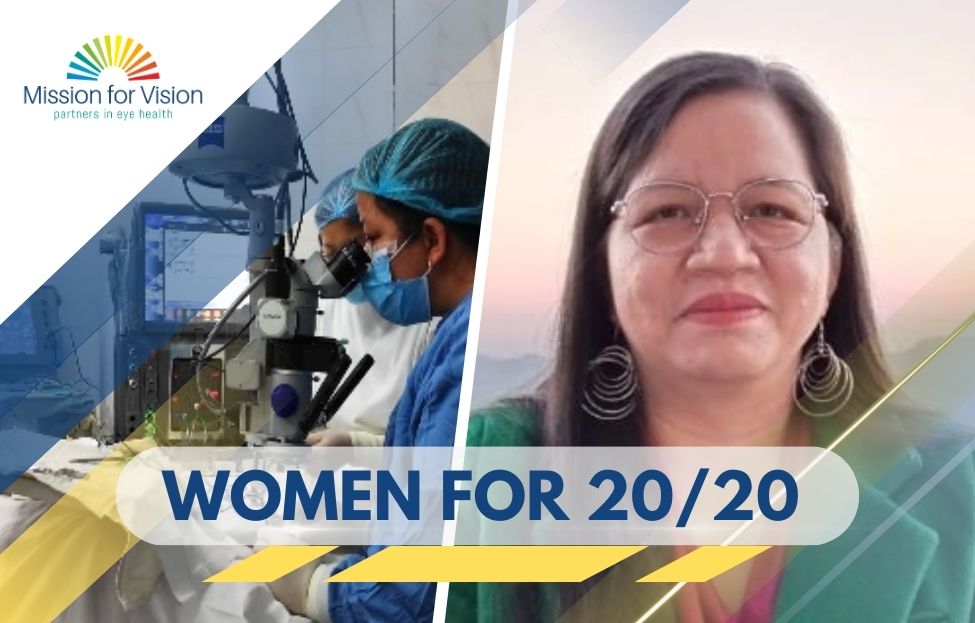
As we celebrated International Women's Day on March 8th, Mission for Vision engaged with women leaders, conducting insightful interviews for our blog series titled "Women for 20/20: Celebrating Women's Leadership in Eye Health". This series aims to spotlight remarkable women leaders within the realms of public eye health and corporate sectors. We were honoured to interview Dr. R. Lalrindiki, Head of the Ophthalmology Department at The Synod Hospital. In this blog post, Dr. Lalrindiki shares her remarkable journey, reflects on the hurdles she has overcome, and imparts motivational insights for women around the globe.
Mission for Vision (MFV): Can you share a brief overview of your professional journey and what has kept you inspired you along this path?
Dr. R. Lalrindiki: I graduated from a Mizo-medium high school in a small village with limited amenities. Pursuing my dream of becoming a doctor seemed unlikely in such circumstances, where studying by candlelight or moonlight was common for me and my friends. However, inspired by a missionary doctor's story, I was determined to follow suit. Transitioning to an English-medium Pre-University Course in Aizawl posed initial challenges, given my background. Despite concerns from my family about getting overwhelmed with my studies, I persevered, exerting extra effort to adapt to the new environment. After securing the 22nd position in the technical interview for Bachelor of Medicine and Bachelor of Surgery (MBBS), I faced a dilemma as there were only 21 seats available. Temporarily enrolling in Bachelor of Dental Surgery (BDS), I continued to hope and pray for an MBBS seat. This marked my first experience living outside Mizoram, where language barriers and cultural differences proved to be significant challenges. Three months later, I received the awaited call for an MBBS seat, but transferring from BDS presented numerous obstacles. Nevertheless, I persisted, relying on prayer and determination. Throughout my studies, I pursued social work, assisting those in need regardless of their circumstances. This dedication led to invitations to participate in various missions and hospitals upon graduation, making me the sole MBBS doctor from my high school to date.
During that period, my aspiration to become a doctor remained strong despite numerous challenges. I persisted in pursuing my dream, keeping thoughts of returning home at bay. However, my father fell seriously ill with cancer, and I had to rush back home. My father had often spoken of Synod Hospital, urging me to work there, and the advice of Dr. C Biakmawia, former Director of Synod Hospital eventually convinced me. Joining as a medical officer in 2003, the workload was daunting, especially in the eye unit. Luckily, I was guided by the almighty throughout, shaping my path to where I am today.
In 2006, sponsored by CBM, I pursued a Diploma in Ophthalmology at Joseph Eye Hospital, Trichy. I completed Low Vision Training at Venu Eye Hospital, Delhi in 2008 and Phaco and Contact Lens Training at SSN, Guwahati in 2012, all sponsored by CBM and Synod Hospital. I have done fellowships in Diabetic Retinopathy training and Vitreo-Retinal Surgery and many others at reputed institutes. In 2019, I attended a training on ‘Management Priority in Eye Care Delivery for Eye Heads’ at LAICO - Aravind Eye Hospital, Madurai, sponsored by CBM and Mission for Vision. My quest for gaining knowledge continues and I keep attending various courses and training programmes in the medical field.
In 2001, the eye department initiated community-based services, conducting surgeries in remote areas. CBM provided vehicles and funding for surveys, salaries, OT renovations, and equipment procurement. Surgeries, including cataract operations, were performed in collaboration with National Programme for Control of Blindness (NPCB), Mizoram. Despite hectic schedules, the dedicated medical staff healed and restored sight in far-flung regions. Since 2015, Synod Hospital Eye Unit partnered with Mission for Vision, launching a cataract prevention project. To ensure safer and higher-quality surgeries, patients were brought to the hospital, renaming the initiative 'In-Reach Cataract Surgical Eye Camp' under the 'Community Eye Health Project.' My goal is to enhance our department by effectively managing eye diseases and providing top-notch patient care. Having state-of-the-art equipment, well-trained staff, and the support of colleagues at all levels in the hospital has kept us motivated. We now have specialists in Oculoplasty, Pediatric and Strabismus, Cornea, and Vitreo-Retinal surgeries, in addition to all ophthalmologists being trained in phacoemulsification surgery and various intraocular lens procedures.
MFV: Can you describe an influential moment or experience that has greatly shaped the direction of your career?
Dr. R. Lalrindiki: Despite initially aspiring to become a missionary doctor in underdeveloped regions, my father's plea and the hospital's requirements convinced me to remain in Mizoram. This pivotal moment steered me towards Ophthalmology, culminating in my current position, marking a transformative journey spurred by personal circumstances.
The need for Vitreo-Retina surgery in the eye department became apparent when all vitreo-retinal cases at the time were referred outside Mizoram. We experienced a tragic incident involving an influential individual who suffered complications, resulting in the loss of sight in the operated eye because we lacked the means to treat complications. Additionally, we encountered a patient with retinal detachment (RD) who couldn't travel outside Mizoram and awaited our assistance, along with an elderly lady who underwent silicone oil infusion (SOI) and later requested silicone oil removal (SOR) at our facility, only to lose her sight, posing a challenge to our skills. Furthermore, our confidence in performing surgeries was hindered by our inability to address complications after initiating phaco-emulsification surgery. Therefore, I took it upon myself to undergo training to tackle these issues. Now, we are well-equipped not only to manage surgical complications but also various retinal issues.
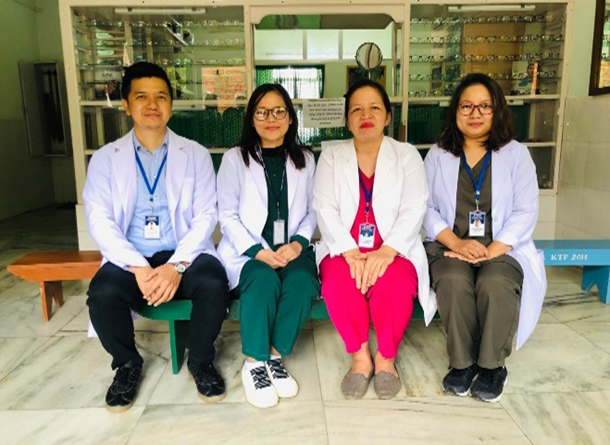
MFV: As a woman leader in the field of ophthalmology, what challenges have you faced, and how have you overcome them?
Dr. R. Lalrindiki: As a woman, it was particularly challenging at the beginning of my career. However, with the support of my family, as well as the opportunities for continuous growth provided by the hospital and the insights and advice from my seniors, I was able to enhance myself not only as an ophthalmologist but also as a professional team leader. Juggling full-time work and motherhood to four children, managing household responsibilities alongside hospital duties, including occasional emergency night shifts, and balancing travel for outreach services and training programmes that necessitated leaving my children behind, presented several challenges that I had to overcome.
Throughout it all, I maintained a strong determination and a desire to improve the overall services of the eye department, aiming to reduce referrals and increase treatments conducted within the hospital itself. The needs of the patients consistently outweighed my own need for comfort. My unwavering belief in God's ability to provide and sustain me bolstered my resolve and provided me with the strength to endure many difficult decisions along the way. The support of the hospital, my seniors, my colleagues, and my aspirations for the department to meet the needs of patients served as true inspirations throughout this journey of progress, which continues to this day.
MFV: In what ways do you think gender plays a role in access to eye care and overall eye health outcomes, especially in underserved communities?
Dr. R. Lalrindiki: Women primarily depend on the male members of the household. Lacking financial autonomy, they tend to prioritise the health of their family members over their own and neglect their own well-being, including eye health. Spending time on household chores and having less control over decision-making are all factors that seem to affect women. Educational status changes these factors adversely. In underserved communities, women may not be prioritised for education, which further leads to negligence in women's eye care.
MFV: What are some common eye health issues that disproportionately affect women, and what steps can be taken to raise awareness and provide better support?
Dr. R. Lalrindiki: Available evidence points to a higher prevalence of blindness among women. Conditions like dry eye syndrome, cataract, glaucoma, and age-related macular degeneration have been shown to be more prevalent in women. Although the genetic component in their pathogenesis might be a factor for the prevalence, it cannot be ignored that women and gender roles in society lead them to neglect their own eye health. Thereby, increasing the risks of blindness in women. Sensitisation of men in the community is a must, where women depend on their male counterparts, as well as reducing the already established social status of women by spreading awareness through community outreach and relieving the financial strain by providing free resources for women will be crucial steps to reduce the gender gap in eye care.
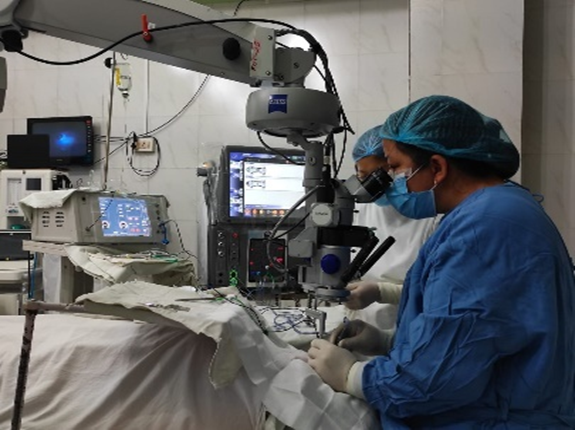
MFV: Could you highlight some initiatives or programmes implemented in your department or the Synod Hospital that specifically address women's eye health needs?
Dr. R. Lalrindiki: Although there are no specific programs implemented for women at the department or hospital, we have a very updated OB-GYN department with specialised doctors. Their collaborative efforts with the eye department have resulted in prompt treatment of pregnancy-related eye conditions. The overall nature of the hospital and outreach programmes allow easier access for women to healthcare, as well as providing awareness to communities.
MFV: In your opinion, what role can technology and innovation play in improving eye healthcare accessibility for women, especially in remote or rural areas?
Dr. R. Lalrindiki: If outreach services can be equipped with new innovations to provide primary eye care to communities, it would reduce the need for transportation, resulting in lower expenditure for the patient. Well-equipped mobile vans with facilities such as IOP monitoring, fundus examination, and spectacle dispensing can travel to remote areas to provide primary eye care and awareness in hard-to-reach places, which often becomes an issue in terrains like northeast India. If there were sterile locations where surgical interventions could be carried out, that would greatly lessen the burden of preventable blindness in underserved communities who could not travel to the base hospital for treatment.
MFV: In your experience, how can we encourage more women to pursue careers in ophthalmology and other STEM (science, technology, engineering, and mathematics) fields related to healthcare?
Dr. R. Lalrindiki: Encouraging women to pursue STEM cannot be handled by a single organisation or the government alone. NGOs in communities as well as women's bodies in the government sector need to work together to raise awareness. The crucial steps would be to promote women's education. Disregarding societal norms, my parents played a crucial role in my education by freeing me from household chores so I could focus on my studies. Therefore, I would like to highlight the need for family support towards education and to spread the stories of inspiring women who have chosen careers in STEM.
MFV: What message would you like to convey to women regarding the importance of prioritising their eye health and overall well-being?
Dr. R. Lalrindiki: As women, the role of caring for the household, our children, and our husbands falls on our shoulders. However, when we—mothers, wives, sisters, daughters—do not prioritise our own health, the family we care for cannot thrive when we are unwell ourselves. We must use our education to achieve financial freedom, broaden our horizons beyond household chores, and empower our fellow sisters. We must raise our daughters to be capable and become strong pillars in society. We should be strong in our will and determination, not succumbing to societal norms, and strive to change society's expectations of women for the better. We envision a woman who is capable, educated, and prioritises herself too.
MFV: As an inspiring and hands-on mother what would you say are your greatest strengths as you continue leading the work at Synod and Mizoram and what have been your greatest battles at home to maintain work-life balance?
Dr. R. Lalrindiki: My greatest strength comes through my faith in God and his grace upon my life. My family, particularly my husband, offers unwavering support and encouragement. He takes on household responsibilities and shares my professional aspirations. He never objects to my training assignments. Additionally, collaborating with my seniors and colleagues at Synod Hospital enhances our collective efforts, strengthening our impact at the hospital. As a mother, juggling between children's needs (especially when they fall sick) and attending trainings/conferences can be challenging, often compelling me to leave the family behind. Nighttime work emergencies, along with the demands of being a full-time working mother, present additional obstacles. Nevertheless, with strong family support and a positive work environment, these challenges can be easily navigated and overcome.
SHARE NOW:
RELATED ARTICLES
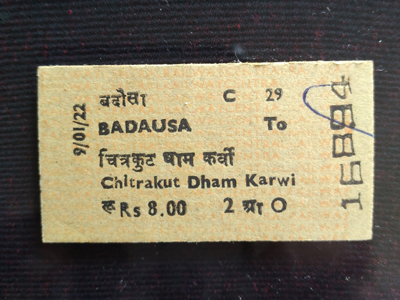
A Special Railway Ticket
Guest author Dr. Sil shares his memorable journey of visiting Sadguru Netra Chikitsalaya in Chitrakoot, Madhya Pradesh
Read More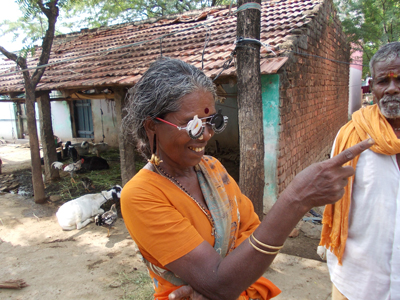
Roots of Mission for Vision
Lijiraj revisits the books of history and shares with us how Mission for Vision came into existence.
Read More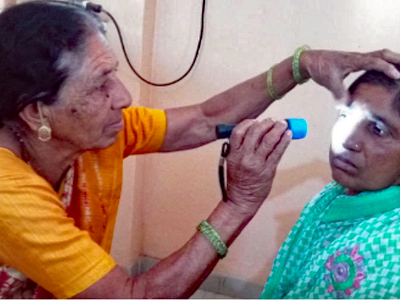
Khairunissa: Gender Balance in Rural India
Khairunissa, 68, has been working with Mission for Vision partner Tulsi Chanrai Eye Hospital as a social worker since the inception of the hospital in 1994 at Nashik.
Read More